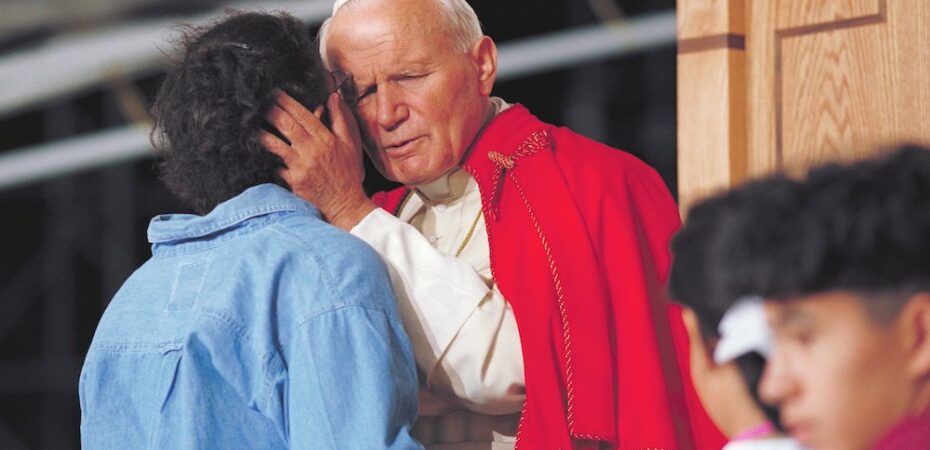Pope St. John Paul II and Servanthood
How Christ’s selfless service is a model for deacons
Deacon Dominic Cerrato Comments Off on Pope St. John Paul II and Servanthood
Pope St. John Paul II, though writing little on the diaconate, nonetheless consistently emphasized the concept of Christ the Servant throughout his pontificate. Drawing upon his extensive writings, we can gain deeper insight into Christ’s redemptive love expressed in sacrifice. Some of John Paul’s thoughts can help us understand the revealing of Christ’s selfless service as an exemplary model not only for the diaconate but, in and through our ministry, for all humanity.
St. John Paul often turned to the New Testament to underscore Christ’s servant leadership. In the Gospel of Mark, Jesus proclaims, “For the Son of Man did not come to be served but to serve” (Mk 10:45). This declaration captures the essence of Christ’s mission to humanity. By washing the feet of his disciples, Jesus demonstrated humility and set an enduring example of service to others. John Paul emphasized that Jesus’ servanthood extended beyond physical acts; it encompassed the ultimate service of self-sacrifice on the cross, offering redemption and salvation to all. Put another way, authentic Christian service must be, at its core, sacrificial.
For John Paul, the Eucharist held immense significance in understanding Christ’s servanthood. In his encyclical Ecclesia de Eucharistia, he highlighted the Last Supper as the supreme example of Jesus’ self-giving love. Christ’s act of washing the disciples’ feet during this meal revealed the deep connection between the Eucharist and service. By offering his body and blood in the Sacrament, Christ invites his followers to imitate his selfless service and love. The Eucharist, as the source and summit of Christian life, nurtures and strengthens believers in their call to serve one another.
John Paul emphasized that participation in the Eucharist is not merely a passive act but an active engagement with Christ’s servant nature. Through the reception of the Eucharist believers are united with Christ, who empowers them to live a life of humble service, imitating his example in their daily lives.
Throughout his life and ministry, John Paul challenged the faithful to embrace the “logic of the Gospel,” a logic that prioritizes service over self-centeredness. In his apostolic exhortation Ecclesia in America, he stressed that this logic counters the prevailing culture of individualism and materialism. By imitating Christ the Servant, believers can transcend selfish desires and commit themselves to the well-being of others.
In all of this, John Paul reminded the faithful that authentic service requires humility, compassion and a willingness to prioritize the needs of others above personal gain. He emphasized that true greatness lies in serving others, echoing Christ’s teaching that “whoever wishes to become great among you will be your servant” (Mk 10:43). He called upon the faithful to extend the spirit of servanthood to all spheres of life, including family, work and society. By embodying Christ’s selflessness and sacrificial love, believers can transform their communities and promote a culture of love, justice and solidarity.
John Paul’s writings provide profound insights into Christ’s role as a servant leader and, by extension, what it means to be a deacon. By highlighting Christ’s servanthood in Scripture, emphasizing the significance of the Eucharist as the source of servanthood, and calling Christians to embrace the “logic of the Gospel,” Pope St. John Paul invites all believers to follow Christ’s example and actively serve others.
DEACON DOMINIC CERRATO, Ph.D., is editor of The Deacon and director of diaconal formation for the Diocese of Joliet, in Illinois. He is the founder of Diaconal Ministries, where he gives national presentations and retreats to deacons and diaconal candidates.





